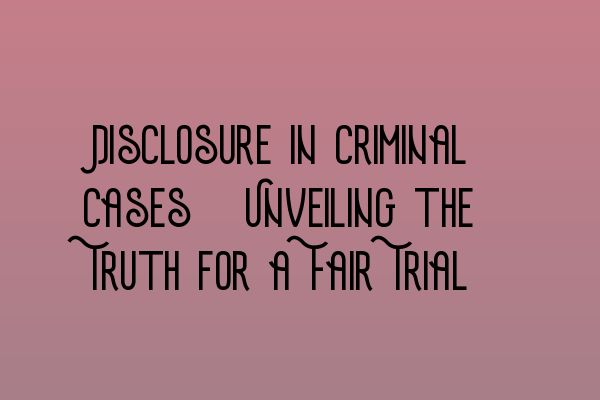Disclosure in Criminal Cases: Unveiling the Truth for a Fair Trial
Welcome to the SQE Criminal Law & Practice blog, where we discuss important topics related to criminal law and provide valuable insights to legal professionals and budding solicitors. In today’s post, we will delve into the crucial concept of disclosure in criminal cases and its role in ensuring a fair trial.
Disclosure, in simple terms, refers to the process by which the prosecution and defense exchange relevant information and evidence before trial. It plays a vital role in delivering justice and upholding the principle of a fair trial. The Criminal Procedure and Investigations Act 1996 outlines the framework for disclosure in England and Wales.
The Importance of Disclosure
In criminal cases, full and effective disclosure is fundamental to ensuring a fair trial. It allows both the prosecution and defense to examine the evidence against each other and prepare their case accordingly. By disclosing all relevant material, including both incriminating and exculpatory evidence, the truth can be unearthed, enabling a just outcome.
However, the duty of disclosure is not solely on the prosecution. The defence also has a responsibility to disclose any information or evidence that may undermine the prosecution’s case or support their own arguments. Failure to comply with disclosure obligations can have serious consequences and may even lead to the collapse of a trial.
Types of Disclosure
Disclosure can be categorized into three main types:
- Initial Disclosure: This involves the initial exchange of material between the prosecution and defense, such as witness statements, expert reports, and CCTV footage. Early disclosure enables both parties to evaluate the strength of the case and make informed decisions.
- Continuing Disclosure: Throughout the course of the case, new evidence may arise. It is essential for both parties to disclose any additional information promptly. This ensures that the trial remains fair and both sides have equal access to the evidence.
- Third-Party Disclosure: In some cases, third parties may possess relevant information or evidence. The prosecution and defense are under a duty to identify and request disclosure from these parties. This can include CCTV footage from businesses, medical records, or financial transactions.
Challenges in Disclosure
Despite its significance, disclosure is not always straightforward. There are various challenges that can arise throughout the process, including:
- Volume of Material: In complex cases, the volume of material can be overwhelming. Reviewing and assessing large quantities of evidence requires time and resources.
- Confidential Material: Certain material may be subject to legal privilege or contain sensitive information. Balancing the right to a fair trial with the need to protect confidential material can be challenging.
- Digital Evidence: With the increasing prevalence of digital devices and online platforms, the collection and disclosure of digital evidence can be complex. This includes social media posts, emails, and electronic communications.
Overcoming these challenges requires expertise, experience, and a comprehensive understanding of the disclosure process. With our SQE 1 Practice Exam Questions and SQE 1 Practice Mocks FLK1 FLK2 courses, aspiring solicitors can master the necessary skills and knowledge to navigate the complexities of disclosure confidently.
Ensuring a Fair Trial
Disclosure is not merely a procedural requirement; it is essential for a fair trial. It promotes transparency, prevents wrongful convictions, and strengthens the integrity of the criminal justice system. By adhering to the principles of disclosure, we can work towards a legal system that upholds justice and respects individual rights.
For more information on SQE 2 preparation courses and SQE 1 preparation courses, visit our website. Stay updated with the latest SRA SQE Exam Dates to plan your legal career effectively.
Thank you for joining us today as we explored the intricacies of disclosure in criminal cases. We hope this article has shed light on the importance of unveiling the truth for a fair trial. Stay tuned for more informative posts from SQE Criminal Law & Practice UK!
